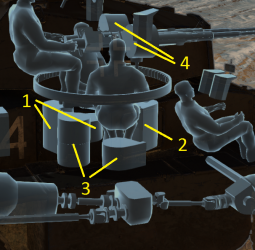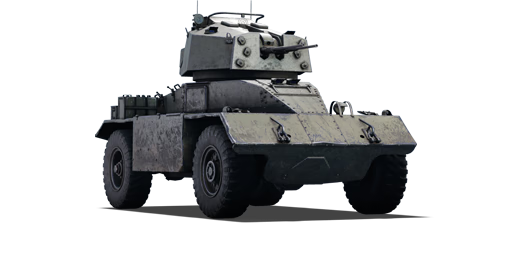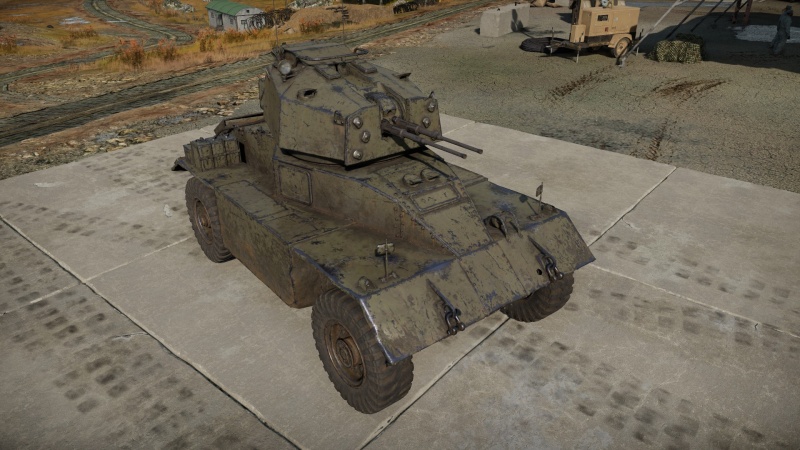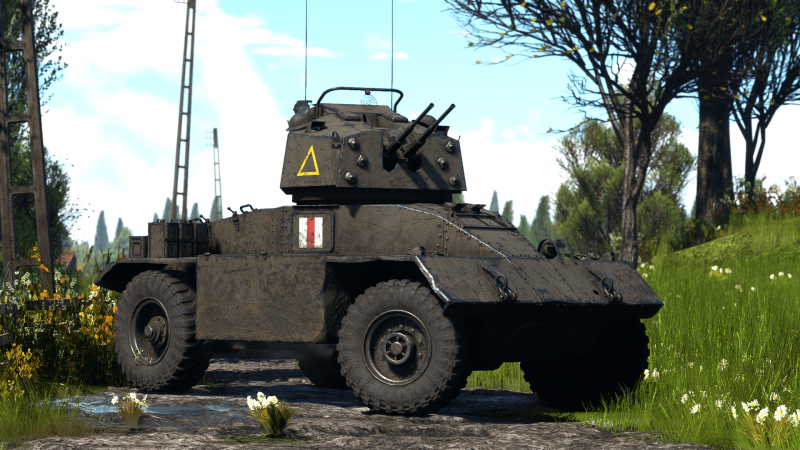AEC AA
Contents
Description
In 1941, the Associated Equipment Company (AEC) created a chassis for an armoured car based on their Matador artillery tractor, drawing on experience gained while fighting Italian armoured cars in North Africa. The prototype was shown at the Cavalry Guard Parade and impressed Churchill, after which a contract was signed initially for 120 units, and ultimately 629 were produced between 1942 and 1943. They were used in battles in North Africa, sometimes alongside the Staghound. The main modifications to the vehicle used the QF 2-pounder, QF 6-pounder, and QF 75 mm guns. In 1944, a prototype SPAA on an AEC chassis was built using a Crusader AA Mk II turret featuring two 20 mm Oerlikon automatic cannons. However, due to the Allies' widespread air superiority, it did not enter mass production.
Introduced in Update 1.55 "Royal Armour" along with the initial British ground tree, the AEC AA is a fairly effective wheeled anti-aircraft gun with good protection. It packs quite the punch, able to be used effectively against both aircraft and light armour. Its armour provides decent protection even against heavy machine guns, while its wheeled chassis has mediocre cross-country ability but high speed, which can help avoid enemy attention if position changes are frequent enough.
General info
Survivability and armour
The AEC AA lacks armour, although it is protected from most smaller calibre machine guns at its battle rating. It is advisable to attempt to position yourself above an enemy, so that: A) they will have a lower ability to see you, and B) so that they will most likely end up shooting the lower part of the tank, which juts out. If they shoot here with an AP shell, it will most likely go straight through and merely take out your transmission.
Armour type:
- Rolled homogeneous armour
- Structural steel (Sand skirts)
| Armour | Front | Sides | Rear | Roof |
|---|---|---|---|---|
| Hull | 17 mm (62-78°) Front glacis 10 mm (42°) Lower glacis 17 mm (49°) + 31 mm Joint plate |
25 mm (0-1°) | 10 mm (58°) Top 14 mm (13°) Bottom |
12 mm 10 mm Rear |
| Turret | 50.8 mm (1-6°) Turret front 50.8 mm (13-60°) Gun mantlet |
50.8 mm (7-9°) | 50.8 mm (6-38°) | 20 mm |
- Wheels are 2 mm thick, structural chassis is 5 mm thick.
- A 14 mm RHA plate separates the engine from the crew compartment.
Mobility
| Game Mode | Max Speed (km/h) | Weight (tons) | Engine power (horsepower) | Power-to-weight ratio (hp/ton) | |||
|---|---|---|---|---|---|---|---|
| Forward | Reverse | Stock | Upgraded | Stock | Upgraded | ||
| Arcade | 73 | 10 | 12.7 | 224 | 301 | 17.64 | 23.7 |
| Realistic | 67 | 9 | 140 | 158 | 11.02 | 12.44 | |
The AEC AA is decently manoeuvrable and has high top speeds, especially on the road. Warning: do not attempt to drive this vehicle on the snow or sand, as it will go more slowly than most heavy tanks at its BR.
Modifications and economy
Armaments
Main armament
The AEC AA sports dual-mount 20 mm autocannons, which excels at devastating planes and even light or medium tanks. The AP rounds provided will shred through almost anything, and it is always advisable to take these. Additionally, these allow you to down heavy bombers.
| 20 mm Oerlikon Mk.II (x2) | Turret rotation speed (°/s) | Reloading rate (seconds) | ||||||||||||
|---|---|---|---|---|---|---|---|---|---|---|---|---|---|---|
| Mode | Capacity (Belt) | Fire rate | Vertical | Horizontal | Stabilizer | Stock | Upgraded | Full | Expert | Aced | Stock | Full | Expert | Aced |
| Arcade | 600 (60) | 450 | -5°/+87° | ±180° | N/A | 35.22 | 48.75 | 59.20 | 65.47 | 69.65 | 7.80 | 6.90 | 6.36 | 6.00 |
| Realistic | 23.80 | 28.00 | 34.00 | 37.60 | 40.00 | |||||||||
Ammunition
- Default: AP-T · HEF-I · AP-T - This belts carries an equal mixture of HEF-I and AP-T.
- HET: HEFI-T · HEF-I · HEF-I - This is the belt you want to research first, since its rounds are the best against aircraft.
- APT: AP-T - These are purely AP belts that are not very useful with 42 mm of penetration. However, it is always a good idea to carry a few for self-defence- it can knockout lightly armoured vehicles.
| Penetration statistics | |||||||
|---|---|---|---|---|---|---|---|
| Ammunition | Penetration @ 0° Angle of Attack (mm) | ||||||
| 10 m | 100 m | 500 m | 1,000 m | 1,500 m | 2,000 m | ||
| HEF-I | 4 | 4 | 3 | 3 | 3 | 3 | |
| AP-T | 38 | 35 | 23 | 14 | 9 | 5 | |
| HEFI-T | 4 | 4 | 3 | 3 | 3 | 3 | |
| Shell details | ||||||||||||
|---|---|---|---|---|---|---|---|---|---|---|---|---|
| Ammunition | Velocity (m/s) |
Projectile mass (kg) |
Fuse delay (m) |
Fuse sensitivity (mm) |
Explosive mass (TNT equivalent) (g) |
Ricochet | ||||||
| 0% | 50% | 100% | ||||||||||
| HEF-I | 838 | 0.12 | 0 | 0.1 | 6 | - | - | - | ||||
| AP-T | 830 | 0.14 | - | - | - | 47° | 60° | 65° | ||||
| HEFI-T | 838 | 0.12 | 0.1 | 0.1 | 5 | 79° | 80° | 81° | ||||
Ammo racks

| Full ammo |
1st rack empty |
2nd rack empty |
3rd rack empty |
4th rack empty |
Visual discrepancy |
|---|---|---|---|---|---|
| 10 | 8 (+2) | 6 (+4) | 4 (+6) | 2 (+8) | Yes |
Optics
| AEC AA Optics | ||
|---|---|---|
| Which ones | Default magnification | Maximum magnification |
| Main Gun optics | x1.85 | x3.5 |
| Comparable optics | So-Ki | |
Usage in battles
The AEC AA can be used as a support tank in most battles and excels at ambushes. It works well at holding down a capture point, or setting traps along roads. It is advisable to always stay near allies so that you can receive help if necessary. If you choose to play the original role of anti-aircraft, make sure to stay in an open (but safe) area, allowing you full range of fire. Sometimes it is advisable to "harass" planes by giving scattered fire to make them think you are a light tank, and then pretending you don't notice them turning to attack you. Aim down the scope until they are within firing range, and shred them to pieces before they have time to react.
Due to the heavy ammunition consumption as SPAA in AA fights, stay at an allied capture point to get ammunition to reload during battle.
When encountering an enemy that's armour can't be pierced, attempt to immobilise the vehicle by disabling the tracks. From here, multiple options are available for the AEC AA depending on the foe. If the enemy has known weak spots, the AEC AA could attempt to manoeuvre to a favourable position. If the enemy is known to be impervious to the AEC AA's armaments, simply keep them disabled (hit the gun barrel as well to increase the enemy's repair time), drop artillery, and withdraw to a safe position until a friendly with a bigger gun can handle the situation.
Pros and cons
Pros:
- Excellent rate of fire
- Fast and mobile with good acceleration
- Closed top, can't be strafed from the sky or hit by artillery shrapnel
- Good turret armour
- Fast turret rotation speed
- Good gun velocity gives good anti-air capability
- Can decimate lightly armoured tank destroyers
Cons:
- Useless against heavily armoured tanks
- Low ammo capacity can't allow for reckless firing
- Poor hull armour
- Taller than other vehicles, making it a large target (easier to hit)
- Has wheels, therefore it can't turn on the spot
- Terrible at driving off-road and on sand or mud
- Turret ring is fairly large, therefore it may become jammed often if hit
- Not enough gun depression (be careful when getting up hills)
History
Development
The basis of the armoured car comes from the Associated Equipment Company (AEC) of Southall, Middlesex. AEC was a manufacturer of truck and bus chassis and the Matador artillery tractor. The armoured car was privately developed in 1941 and was based on the Matador. The design was shown to British officials in the same year during the Horse Guards Parade and was received favourably by many, including Winston Churchill. Orders started filing in for the armoured car, and AEC tried to give it comparable firepower to current tanks at the time. Thus, the first version, Mk.I, came with a turret adapted from the Valentine tank equipped with the 2-pounder. The next version, Mk.II, had this upgraded with a heavier turret and a 6-pounder gun, then with the QF 75 mm gun on the Mk.III. An anti-aircraft version using the same turret from the Crusader AA Mk II and the twin Oerlikon guns were also developed for the armoured car. During its production life from 1942 to 1943, 629 Armoured cars in total were built.
Combat usage
The Armoured cars equipped with tank guns were used in North Africa in late 1942. Some on-field modifications include changing out the Valentine turret for a Crusader turret with the 6-pounder. The armoured cars continued to see fighting in various parts of Europe in combination with other armoured cars and remained in service until replaced by the Alvis Saladin in 1958.
Though the anti-aircraft version was made, it never entered production due to the growing Allied air superiority over the Axis forces, making the anti-aircraft version unnecessary to guard the advancing Allied units from air attacks.
Media
- Skins
See also
Vehicles with the same chassis:
Vehicles with the same weapon system:
External links
| Associated Equipment Company (AEC) | |
|---|---|
| Armoured Cars | AEC Mk II |
| SPAAs | AEC AA |
| Britain anti-aircraft vehicles | |
|---|---|
| Crusader AA | Crusader AA Mk I · Crusader AA Mk II |
| Wheeled | Staghound AA · AEC AA |
| Radar SPAAG | Chieftain Marksman |
| Missile SPAA | Stormer AD · Stormer HVM |
| Other | Light AA Mk I · Falcon |
| Canada | Skink · ADATS (M113) |
| South Africa | Ystervark · Bosvark · ZA-35 |






